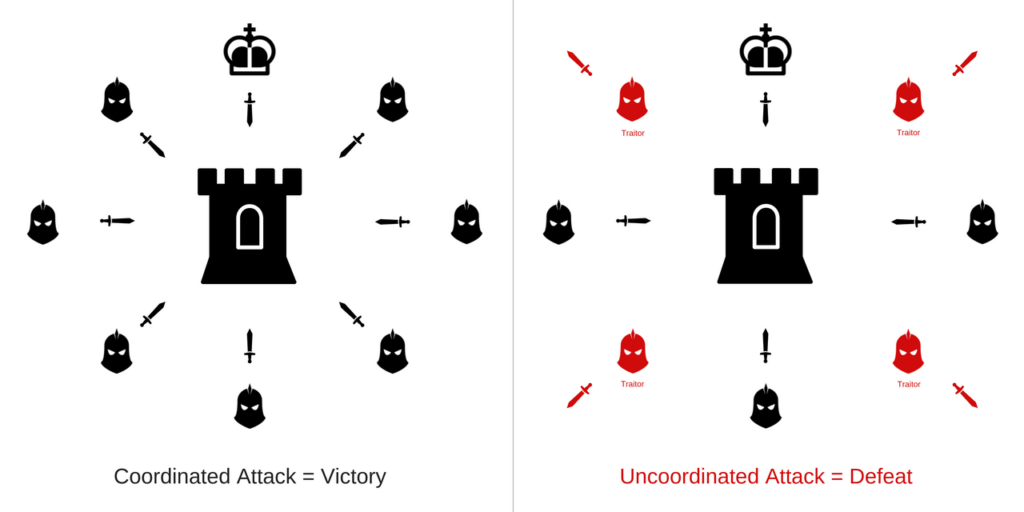We may be convinced of the importance of Bitcoin, but there is a good chance some of your friends believe it can’t be trusted. The lesser-known aspects of Bitcoin and the blockchain, and how they relate to the Byzantine General Problem, could turn skeptics into advocates.
The Generals Problem
The Byzantine Generals Problem is a thought experiment dating back centuries. It is rooted in the idea that a number of generals and their armies surrounding an enemy city need to agree when to attack. Separated by distance and lack of instant communication, they need consensus to stage a successful attack. Messages can be sent from general to general but security is lacking. An overlying fear exists that the messages could be intercepted, delayed, or tampered with by the enemy.
To win the battle, trusted consensus must be met amongst the generals.

History has provided us with a number of clever ways to verify the truth. These include but not limited to signatures, official seals, blue social media checkmarks, security strips, secret handshakes, and background checks.
Tactics like those mentioned above have continued to evolve as bad actors continue to find ways of undermining systems for their advantage.
The recent development of bitcoin, and in turn, blockchain, solves the generals’ problem. Suspicious “generals” using blockchain can reliably send each other messages to coordinate an action despite never having met before.

It’s imperative that the Bitcoin we transact with isn’t manipulated, just like the generals must know their messages must remain untouched. Satoshi Nakamoto’s decision to have the blockchain function through proof-of-work solves this problem. It uses math, encryption, and computing power rather than outside third parties assigning blue checkmarks or secret handshakes.
Bitcoin’s Whitepaper
In the original white paper, Nakamoto states that the transactions are “computationally impractical for an attacker to change if honest nodes control a majority of CPU power.” In other words, the more people involved in the system, the more trusted the network of transactions. For our generals, a majority of honest generals overpowers a general with ill intentions. The official white paper in the link below fully explains this, as a warning, it is incredibly dense.

Satoshi’s vision of honest, reliable, and direct transactions in finance is today’s closest system to solving the Byzantine Generals Problem. Believing that when a user is incentivized to be honest, a network will become that much stronger. Don’t be afraid to challenge your skeptical friend and ask them what guarantees their preferred methods of transacting. More than likely the best answer you will get is it’s the way they have always done it or it’s the most popular. Many of the issues already exist in traditional systems, they are just hidden from view. If you want further proof Bitcoin can change the world, read on why the world is at an inflection point.
Bitcoin’s Original White Paper: https://bitcoin.org/bitcoin.pdf
